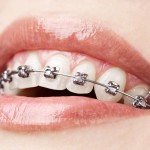
The bonding of orthodontic brackets to teeth is important for effective and efficient treatment. The introduction of adhesive precoated brackets was claimed to reduce failure rates due to improved control of the bracket and adhesive.
The aim of this review was to assess whether adhesive precoated brackets (APC) are more efficient than operator-coated brackets (OPC) regarding failure rate, bonding time, patient experience, gingival health, plaque accumulation, and white spot lesion formation.
Methods
Searches were conducted in the Cochrane Central Register of Controlled Trials (CENTRAL), Scopus, PubMed/Medline, Web of Science, and Google Scholar databases and orthodontic journals with no date or language restrictions. Randomised controlled trials (RCTs) in patients undergoing fixed appliance orthodontic treatment with study duration of at least 6 months were considered.
Two reviewers independently selected studies, abstracted data and assessed risk of bias using the Cochrane tool. The outcomes considered were bracket failure rate, patient experience, bonding time, gingival health, plaque accumulation, white spot lesion formation, and operator experience. Meta-analysis was conducted.
Results
- 5 RCTs (1 parallel, 4 split mouth) were included.
- 4 studies reported failure rates using metal brackets for both APC and OPC systems.
- 1 study compared clear APC to clear OPC.
- 3 studies reported bonding time differences between the bracket systems.
- 1 study was considered to be at low risk of bias, 4 studies at unclear risk of bias.
- Random effect meta-analysis showed: –
- No statistically significant differences in bond failures between bracket systems, Odds Ratio (OR) = 0.890 (95%CI; 0.35 to 2.28) [ 4 studies].
- Bonding time was longer with APC; Mean difference = 4.47 (95%CI;0.87 to 8.07) [3 studies] but not considered to be clinically significant.
- There was insufficient evidence to assess plaque accumulation, gingival health, and either patient or operator experience.
Conclusions
The authors concluded: –
There is no superiority of either bracket system regarding failure rate. OPC are statistically significantly superior over APC in bonding time although this is most likely not clinically significant.
Comments
While a broad search strategy has been undertaken only a small number or studies were available which met the search criteria and only 1 of the studies was considered to be at low risk of bias. The review found no difference in failure rates between the studies but a small difference in bonding time. However, there was no information on a number of the other potential outcomes and the quality of the available studies means that the findings should be viewed cautiously.
Last year the Cochrane review on adhesives for orthodontic brackets was published (Dental Elf 24th May 2018) which included 3 studies finding no differences between the tested adhesives. Two of the studies included in the current review were excluded from the Cochrane review one of the because the statistical analysis of the split mouth study was considered to be inappropriate as it di not account for clustering.
Links
Primary Paper
Alakttash AM, Fawzi M, Bearn D. Adhesive precoated bracket systems and operator coated bracket systems: Is there any difference? A systematic review and meta-analysis. Angle Orthod. 2018 Dec 17. doi: 10.2319/051818-373.1. [Epub ahead of print] PubMed PMID: 30556748.
Original review protocol on PROSPERO
Other references
Dental Elf – 24th May 2018
